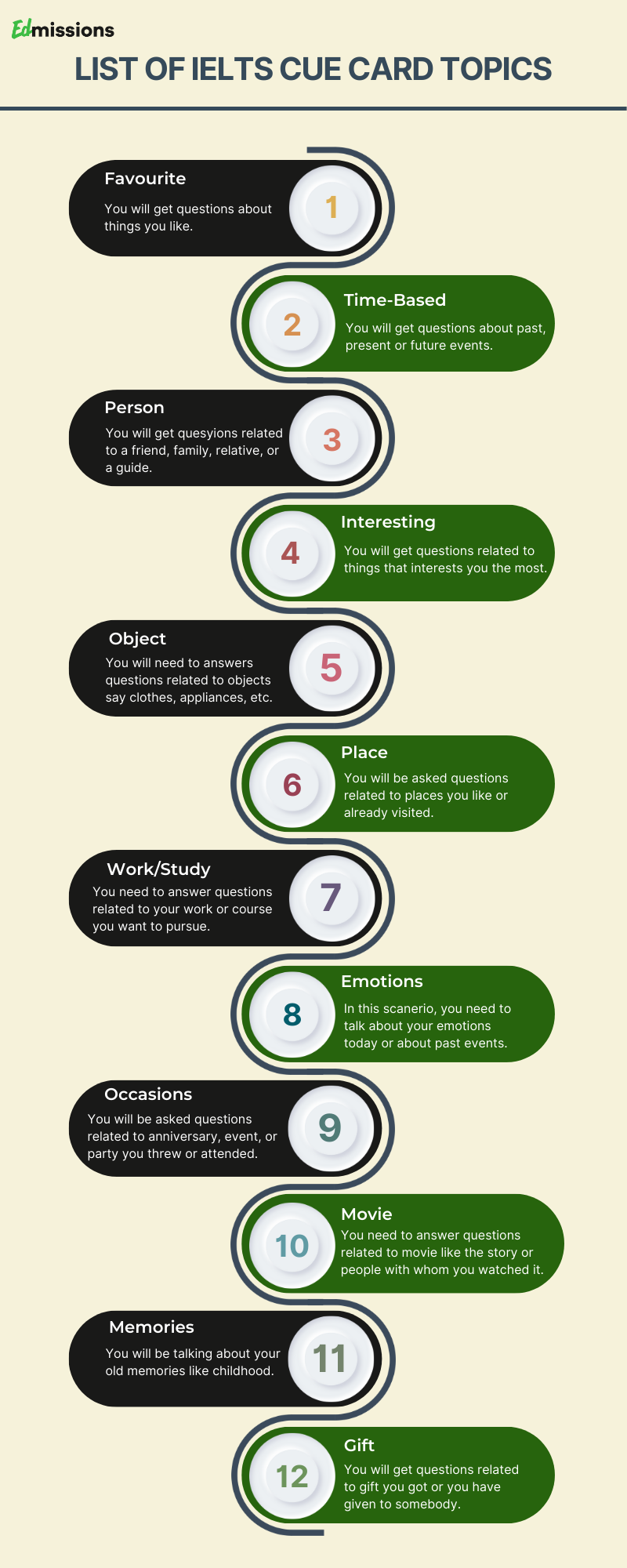IELTS Speaking Cue Cards Topics & Samples with Answers 2024
6 mins read 194838 Views
By Prabhadri Suman|Updated On - 2024-01-11 08:28:23
Explore the latest IELTS Cue Card topics and model answers from 2024 exams. Master the speaking syllabus and learn quick strategies for scoring Band 7+ in just 60 seconds.

Topics Covered:
- What is a Cue Card?
- Parts of IELTS Speaking Test
- How are IELTS Cue Cards Marked?
- IELTS Speaking Cue Cards Topics 2024
- IELTS Cue cards Topics Section wise
- IELTS Speaking Cards Questions and Answers
- Speaking Part 2 Cue Card Example
- IELTS Part 3 Questions and Answers
- Do IELTS cue cards repeat?
- How can I get 7 band in IELTS Cue Cards Speaking?
- Conclusion
IELTS Speaking Cue Card is the second task of IELTS speaking test. During this task, you are required to effectively communicate on a specific topic provided in the IELTS cue card. Before speaking, you are given one minute to prepare. The test evaluates the candidate's pronunciation, fluency, grammar, and vocabulary as a crucial part of the test.
This article will discover everything you need to know about
IELTS speaking cue cards 2024
, including sample questions, preparation tips, and more.
What is a Cue Card?
An IELTS speaking cue card is a task card used in the IELTS (International English Language Testing System) Speaking test, particularly in Part 2. The cue card contains a particular topic with a set of guidelines that the test taker should talk and will be given 1 minute of preparation time to think and generate ideas. Then candidates need to speak for about 2-3 minutes until the examiner asks them to stop.
This part of the IELTS test assesses the candidate's ability to speak at length on a given topic, organize their thoughts, use language appropriately, and show a range of vocabulary and grammatical structures.
Parts of IELTS Speaking Test
The speaking test takes around 11-14 minutes and are divided into 3 parts:
- Introduction & Interview: At the beginning of the interview, the interviewer will usually ask questions about generic topics such as family, education, hobbies, and work. This part lasts four to five minutes.
- Speak on a cue card: At first, the test-taker will be given 1 minute time to jot down notes on the topic and then need to speaks on the topic for at least 2 minutes until the examiner not ask to stop. After that, follow-up queries are asked about the same subject. In this phase, the candidate's ability to express himself without hesitation is measured in addition to his language ability. Usually, this lasts for three to four minutes.
- Long conversations: Examiner will ask questions about the cue card topic. This part of the interview lasts for 4-5 minutes.
Read also: IELTS exam dates and IELTS exam fees in India
How are IELTS Cue Cards Marked?
During the 11-15 minute speaking test, the examiner assesses the candidate's language skills based on four criteria:
- Fluency and Coherence (FC): The candidate's pronunciation of words, intonation, clarity and single phonetic sounds will be evaluated.
- Lexical Resource (LR): The candidate's vocabulary proficiency is assessed by checking whether she employs different words to express the same idea. Even paraphrasing is accounted for.
- Grammar (GR): The structure of sentences and how they are formed are evaluated. This must not sound forced and must be accurate.
- Pronunciation (PR): Checks whether the candidate can speak fluently and coherently or not. Pronouns, conjunctions, and other grammatical devices are tested in addition to the candidate's ability to speak for a long time.
The examiner assesses the candidate's ability to speak fluently without repetition or interruption, the range of vocabulary used, the grammatical accuracy, and the correct pronunciation of English words. Each factor is assigned a value, and the cumulative value forms the overall score. The criterion is scored between 0-9, and the average of the four scores is calculated to obtain the band score.
For example,
if a candidate scores 6 in fluency and coherence, 6.5 in lexical resource, 7 in grammar, and 6 in pronunciation, the total score is 25.5. Dividing this by 4 gives an average score of 6.3, the band score.
IELTS Speaking Cue Cards Topics 2024
Many candidates are intimidated by the speaking portion of the exam because they need to familiarize themselves with the types of questions that will be asked. Because of this, their self-confidence is lowered and they pause more frequently, resulting in a lower band score.
Here is a list of the latest
IELTS cue card 2024
for the IELTS exam in 2024 for candidates to practice beforehand and self-assess. This will enable them to grasp what is required in each section. On the other hand, memorization is not beneficial and should be avoided at all costs.
List Of Expected Speaking Cue Cards 2024
- A part-time job you would wish to pursue abroad
- The shopping experience in a street market
- An interesting thing you saw on social media
- A city where you want to live in the future
- Talk about your favorite singer
- A piece of local news that intrigued you
- A new public-private building you would want to visit
- Moving to a new school or shifting to a new home
- One of the most difficult things you have done
- A book that you enjoy reading
- A café you would like to visit
- A leisure activity that you would want to try near or in the sea
- Art and craft activity that you had at school
- An occasion where you did not use your time properly
- A quiet place you would like to visit
- A movie you liked
- A time when you helped your friend
- Describe a time when you were late for some work
- A company that you wish to be employed at
- A website that you often use
- An idol who you looked up to when you were a child
- A risk that led to a positive outcome
- A gadget that is your favorite
- A movie that is your inspiration
- An experience that you found the most exciting
- A practical skill you have learned
- A family member with whom you bond well with
- An aspect of science that interests you
- A short journey that you had taken but ended up disliking it
- Experience of visiting a farm
- Your favorite author
- A song or poem on the history of the country
- The habit your friend has and why you would like to develop that
- Explain what would you do if you won a large prize money
- An advertisement that remained in your memory
- Experience in solving a puzzle
- A creative personality whose work you look up to
- A friend who has played a pivotal role in your life
- Explain why you admire the certain businessman
- A poisonous plant that exists in your homeland or country
- An electronic device you wish to own
- Describe an occasion which you were afraid of
- An ambition that you have harnessed over a long period of time
- Description of a dream that you wish to come true
- An experience where you had been cheated
- An important decision you made
- Your favorite politician
- An application made through AI
- A pandemic that you experienced
- A time which made you revisit your opinion and change it
Want to study abroad? Get FREE guidance!! Click to Know More!
IELTS Cue cards Topics Section wise
Check out the best
cue cards for IELTS 2024
that you must consider:

Favourite
These are
IELTS speaking topics 2024
that ask you about things you like.
- Describe your favourite picture or photography you like
- A song that has special meaning to you
- A story/ novel interests you
- Describe a special or favourite toy you liked in your childhood
- Describe a favourite song that you like
- Describe a restaurant you like (to go to)/ that impresses you
- Exciting sport
- Describe an indoor game that you would like to play
- Describe an area of science you like or interested in
- Describe a free time activity you like to do after study or work
- What Lake, River, or Sea Do You Like to Visit?
- Describe a museum you've been to and enjoyed.
- Describe a culture from abroad that you admire.
- Describe your favourite swimming spot.
- What is your favorite newspaper or magazine?
- Describe a writer you would like to meet
- Describe a type of clothes you like
- Describe your favourite furniture at home
- Describe your favourite shop
- Describe a speech that somebody gave and you liked
- Describe your favorite drink
- Describe your favourite season
- Describe a shop you often go to
- Describe a TV or Radio Presenter you like
Time-based
These cards provide prompts to discuss occurrences that have happened in the past, are happening in the present, and will take place in the future.
- A subject at school
- Things you want to buy in the future
- An age/stage in your life you enjoyed most
- Which family member do you spend the most time with
- Time You Used a Foreign Language to communicate
- Time when you failed to keep an appointment
- something you did that was time-wasting
- Describe an occasion when you were staring at the sky
- Tell about a time when you received good news.
- Talk about a moment when you were extremely busy.
- Describe a time when you felt incredibly scared.
- Tell about a time you got lost.
- Share an occasion when you answered a call from a stranger.
- Describe A time whenever you borrowed anything
- Share an instance when you used the internet to find a solution.
- Describe a time when you were stuck in a traffic jam
- Describe a time when you had to go to a hospital or see a doctor
- Describe a situation (or time) when you received some useful advice
- A time when someone apologized to you
- Describe a time you had to change your plan
- Describe a time you received terrible service
Person
These are types of cue cards where you will ask about your friend or a guide.
- A person you admire/love essay
- Describe someone you consider a good leader
- Describe one of your family member you spend the most time with
- An occasion you unexpectedly met someone for the first time
- Describe someone in the news you like to meet
- Someone/something made a lot of noise
- An older person who you admire
- A good/best friend
- Describe an old friend
- Describe a family member
- An interesting neighbor you like
- Talk about an interesting conversation you had with a stranger
- A person speak a second (foreign) language well
- A time when you waited for something or someone to arrive
- Describe a person you recently met
- Describe a Person who has done a lot of Work to Help People
- Describe a renowned person you would like to meet
- Describe a person who is friendly to other
- Talk About a Person who Inspired you
- A person with foreign language proficiency
- Describe a person who has lived with you in the past.
- Describe a person you have seen who is attractive or handsome
- Describe a person with interesting ideas or viewpoints.
- Name a person who supported you in achieving a goal.
- Describe a historical person.
- Describe An Interesting Person You Know
-
Describe a polite person you met
Family
On these kinds of cue cards, you will be asked to discuss your family.
- Describe your family
- Describe a family event you are looking forward to
- Describe a family picnic or tour you have had
- Mention A Family You Know.
- Talk about a hobby someone in your family has
- Share an experience of teaching your friend or family member
- Describe a Family Member
- Describe a family not your own that you like
Object
These cue cards will query you about various items such as objects.
- Describe a picture or photograph in your home
- A gift you gave that took a long time to choose
- Describe a piece of electronic equipment that you find useful
- A time you borrowed something useful
- A house/apartment you like to live in
- A product you were happy with
- An item of clothing that someone bought for you
- Describe a painting or work of art
- Describe a time someone or something made noise
- Describe an electronic machine you want to buy
- Describe an antique item at your home
- Describe a time when you misplaced something.
- Describe Something you want to Buy but can’t Afford
- Describe Something You Liked Very Much Which You Bought for your Home
- Describe Something Colourful that you Bought in the Past
- Describe a thing that you bought and felt pleased
- Something you Bought that you were not happy with
- Describe something you bought but you do not often use
Place
These are the cards that prompt you to talk about places that you plan to go to or have already been.
- A place you remember well that is full of color
- A country you have not been to yet
- A street that you like to visit
- Describe a polluted place
- A place near water you visited
- Describe a place where you often go to relax
- Describe a city or a town
- Describe a place that has a special meaning to you
- Describe a place that you have visited and particularly liked
- Describe a place you would like to visit
- Describe a peaceful place you have visited
- Describe a transportation problem in your city/town
- Describe a place you know that has a beautiful environment
- Describe a historical place that you know
- Describe an interesting place in your home town
- Describe a foreign country you have never been to
- Describe a house/apartment you like to live in
- Describe a city you want to visit in the future
- Describe a country you have visited
- Describe a trip which was not up to your expectations
- Describe a place where you are able to relax
- Describe a quiet place
- Describe a café that you have been to/that you like
- Describe a shop just opened in your hometown
- Describe your ideal house
- Describe A Hotel You Have Stayed In
- Describe a Street in your Hometown that you know well
- Describe a tourist attraction that you have visited
- Describe a house/ apartment that someone you know lives in
- Describe a library you have visited
- Describe a Place that your Parents Took You To
Work/study:
- A project at work or homework assignment
- A course you like to study and found useful
- Describe a piece of work you did quickly
- Describe your dream/ideal/perfect job
- Describe something that you want to learn more
- Describe an educational tv programme that you have seen
- Describe your study room
- Describe a school you have studied in
- Describe an idea you had for improving something at work or college
- Describe an unusual job
- Describe a seminar or workshop you have attended
- Describe a subject that you did not like in the past, but now you like it
- Describe a project that you were once involved in
- Describe a well-paid job you would like to have in the future
- Describe a job your grandparents did
- Describe a subject you used to dislike but now have interest in
- Describe a free day off study or work
- Describe a part-time job you have ever done
- Describe an Academic Success that you Achieved
Emotions/aspirations:
- Ambition you have not yet achieved
- Describe something a child that made you laugh
- A paid job you/a friend enjoyed doing
- An experience you had as a member of a team
- A disagreement you had with a friend
- A recent activity or event that made you happy
- A difficult decision you made in your life
- A tv program that made you laugh
- A goal that you have
- Describe the best and exciting experience in your life
- Describe an exciting or interesting thing you did
- Describe an advertisement which you found very persuasive
- A time you use your imagination
- A time you need to use imagination
- A book that had a major influence on you
- Describe a success your friend has had or achieved
- A special and memorable meal you have had
- A situation made you angry
- Describe an experience you spent time with a child that you know
- A positive experience when you were a teenager
- Describe an unusual/ an unforgettable or memorable meal
- Describe a time you were friendly to someone you didn’t like
- Describe an ambition you have not achieved yet
- Describe how you behaved in a stressful situation
- Describe a song that has special meaning for you
- Describe a piece of information that you think is not correct
- Describe a decision which you have made that you feel was wrong
- Happy Marriage
Occasions :
- An occasion when you got up very early in the morning
- Describe a birthday party celebration that you attended
- Describe a party that you enjoyed
- Describe an occasion when you received good service from a company
- Describe an occasion when you got up extremely early
- Describe an occasion when you wore your best clothes
- An occasion a home appliance broke down
- Describe an occasion you borrowed something from somebody
Recall:
- Describe a teacher from your past that you remember
- Describe a photograph that you remember
- Describe a garden you remember visiting
- Describe a dream you remember well
- Describe a childhood memory you have
- Describe a happy childhood event you remember
- Describe a journey that you remember well
- Describe a new year celebration that you still remember
- Describe something you remember from your school or college days
- Describe a rainy day you can remember
- Describe an accident you heard about
- Describe a pleasant surprise you had
Popular:
- Describe a story popular in your country
- Describe a popular musical instrument in your country
- Describe a famous celebrity from your country
- Describe a popular sport in your country
- Describe a popular event in your country
Activity:
- Describe a leisure activity (a game, hobby, or sport) that is popular in your country
- Describe an indoor game you have enjoyed playing in your free time
- Describe an indoor game that you played in your childhood
- Describe an free time activity you like to do after study or work
- A recent activity or event that made you happy
- Art or craft activity you did at school
- Describe a game you play on your cell phone
- Describe an activity you recently took part in
- Describe an exciting sport you know
- Describe an indoor game that you liked to play when you were a child
- Describe a sport that you have learned
- Describe a sport you enjoy playing
- Describe an activity you enjoy doing in your free time
- Describe a competition that you took part in
- Describe an activity that you enjoy that takes place in or near water
- Describe an unusual activity you’ve recently taken up
Something important:
- Describe an important change in your life
- Describe something you own which is very important to you
- Describe a festival that is important in your country
- Describe an important conversation that Influenced You
- Describe a gift you have received that was important to you
- Describe an important historical event in your country
- Describe an important letter or email you wrote
- Describe a traffic rule or law you know about
- Describe a time when you forgot something important
- Describe an important decision that you made with the help of others
- Describe something you have always wanted to do but have not done yet
- Describe something important you have learned recently
- Describe something important that you bought recently
Life :
- Describe an invention that has changed people's life
- Describe life in a particular period of history
- Describe a typical day in your life when you were a child
- An age/stage in your life you enjoyed most
- A difficult decision you made in your life
- Describe the Best and exciting experience in your life
- Describe a success in your life
- Describe a life-changing experience you have had
Event:
- A memorable event from your school days
- Describe an event you felt unhappy about
- A recent activity or event that made you happy
- Describe a particular event in which you were successful
- Describe a birthday party or celebration that you attended recently
- Describe an event when someone denied your request
- Describe an outdoor sport you played for the first time
- Describe a party you attended before
- Describe a music concert you have seen
- Describe a wedding you have attended
Someone :
- Describe something kind that someone did for you
- Talk about a situation when you taught something to someone
- Describe a time you were friendly to someone you didn’t like
- Describe a time someone or something made noise
- An item of clothing that someone bought for you
- Describe someone in the news you like to meet
- An occasion you unexpectedly met someone for the first time
- Describe someone you consider a good leader
- Describe the advice you gave someone
- Describe a decision made by others you disagreed with
- Describe a situation when you had to be nice to someone you dislike
- Describe a couple you know who have a happy marriage
- Describe someone you know who is a good teacher
- Describe a time when you first met someone
- Describe an occasion when you had to wait a long time for someone
Child :
- Describe a child whom you know
- Describe something a child that made you laugh
- Describe an experience you spent time with a child
- Describe a game (not a sport) you played in your childhood
- Describe where did you live when you were a child
Who you admire:
- Describe an artist or entertainer you admire
- Describe the person in your family who you most admire
- Describe a creative person whom you admire the most
- Describe a person you love/like/admire
- Describe an old person you admire the most
Useful:
- Describe a useful plant you know about
- Describe a useful website you have visited
- Describe a piece of electronic equipment that you find useful
- A time you borrowed something useful
- Describe a blog or news that you find useful
- Describe a documentary you find useful
- Describe a channel you find useful
App/mobile
- A program or an app in your computer/ phone
- Describe an app you use on your mobile phone
- Describe a time when you were not allowed to use a mobile phone
- Describe a website you have bought something from
- Describe an app you mostly buy things
Business:
- Describe a successful small company or business that you know
- Describe a successful businessman you know
- Describe your idea of starting a new business
- Describe a small business you want to start
- Describe a businessman you admire
Movie:
- Describe a movie or performance you recently watched
- Film/movie that you watched and did not enjoy
- Describe a Hollywood film you liked
- A Character in a Movie/Tv Program you like
- Describe a film or TV program that made you laugh a lot
Famous:
- Describe a famous person that you are interested in
- Describe a famous building/landmark
- Describe a famous food item
- Describe a famous athlete you know.
- Describe a famous chef you know.
Interesting:
- Describe an interesting talk or a lecture you have heard
- Describe an interesting story you have read or heard
- Describe an exciting or interesting thing you did in past
- Describe an interesting animal you have ever seen
- Describe a piece of local news that you found interesting
- Describe a story or a novel that was interesting to you
- Describe a bicycle/motorbike/car trip that is interesting
- Describe an area of science that interests you
- Describe a big/large company you are interested in
- Describe something interesting you learned from the internet
- Describe a book you have recently read
- Describe an interesting house or apartment you visited
- An Interesting Neighbor You Like
- Talk about an interesting conversation you had with a stranger
- An educational trip
- Describe a piece of good news that you heard or received
Gift :
- Describe the best gift you have ever received
- A gift you gave to someone that took a long time for you to Select
- Talk about a gift you received in your childhood.
- Describe a gift you received on your birthday.
- Describe something you bought this year.
- Describe a memorable gift.
- Describe a valuable possession you have.
Change:
- Describe a change that will improve your local area
- Describe a change you would like to have in you.
- Describe an important change in your life.
- Describe a positive change in your life
- A change which has changed your life
Your country:
- Describe a serious environmental problem in your country
- Describe a Landscape in Your Country
- Describe an important day you celebrate in your country
- Describe an interesting part of your country
- Describe an important plant in your country
Health:
- Describe a health problem you once had
- Describe something healthy you enjoy doing
- Describe a practice that you undertake to maintain your fitness and well-being.
- Describe an article about health that you came across either online or in a magazine.
- Describe a healthy way of living that you are familiar with.
- Describe a physical activity or sport that you engage in for the purpose of staying fit.
- Describe an endeavor that you undertake for your physical or mental health.
- Describe an experience where you did something beneficial for your health.
- Describe an Activity you do for your Health or Fitness.
- Describe Something you Have Done that is Good for Your Health
Memories:
- A childhood event that made you happy
- A photograph that is really close to your heart
- Describe a memorable event in your life.
- Describe a funny childhood event.
- Describe something you can recall from your childhood.
- How did you spend your childhood?
- Who was your childhood hero?
- Describe an event you remember clearly.
- Describe an interesting event you still remember.
Routine
- Your favorite part of the day
- Describe a time of the day that you like.
- Have you ever changed your routine?
- Do you usually have the same routine every day?
- Do you think it is important to have a daily routine for your study?
- What part of your day do you like the best?
- What is the busiest part of the day for you?
Sports
- A sport you enjoy playing
- A gathering you had been to
- Any activity you want to try
- Describe a popular sport or game in your country.
- Describe a sport you like to play.
- Describe the most popular sports in your hometown.
- Describe an outdoor activity you participate in.
- What sports did you do at school?
- What sports do you play to keep fit?
Travel
- A place you desire to visit.
- A recent trip you took
- A place you consider to be contaminated
- Describe a visit to one of your relative's house.
- Describe your journey to your hometown.
- Describe a journey you took to a foreign country.
- Talk about a journey you disliked.
Experience
- A time when you imagined something
- Any situation that had made you grumpy or angry
- Describe the Best experience in your life ·
- Describe an exciting experience in your life ·
- An experience you had as a member of a team
- Describe an experience you had with a child you know
- A positive experience when you were a teenager
Food
- Delicious supper anything you ate outside
- Describe a food item you often eat.
- Describe Your favorite food joint you have had with your friends.
- Describe a food you eat outside your home.
- Describe a food item you know how to cook.
- Describe a food you had with your friends.
Reading
- Your preferred book
- A website that you frequently visit
- Describe the Best Comics to read
- Describe an exciting book to read
- Describe the best newspaper to read.
- Positive feedback when reading a novel.
Entertainment
- Funny comedian who you find entertaining
- Your favorite television programs
- Describe an interesting song
- Describe a toy you liked in your childhood
- Describe your favourite movie
Buildings
- A building which you like
- Describe a building or construction which impressed you
- Describe a modern building
- Describe an old building that you like
- Describe a tall building in your city you like or dislike
News
- Any good news that you have received recently
- Describe a news story you have read or heard about recently
- Describe a piece of local news that people are interested in
- Describe a piece of international news you have just recently heard
Other cue cards:
- A law about environment
- An article about healthy living that you read from magazine or online
- A film you watched at home or in a cinema
- The first time you used a foreign language to communicate
- Local news people interested in
- Describe something you learned in a place or from someone
- A meal you had with your friends in a restaurant
- A sport you have learned
- Describe a family you know
- Describe a skill
- Describe a natural landscape scenery
- Describe a bicycle/bike/ car trip
- Describe a language other than English you would like to learn
- Describe a game/ sport
- Describe a big/large company you are interested in
- A time you miss an appointment
- Something you did which was a waste of time
- An important letter or email you wrote
- Art or craft activity you did at school
- Describe something you do that keeps you fit and healthy
- Describe a time when you were looked at the sky
IELTS Speaking Cards Questions and Answers
Check out IELTS cue card topics with answers that will help you understand it more.
“Do you like to travel?”
Whether or not they enjoy traveling, the candidate must explain here. They can also express their preference for a certain location and explain why.
"What activities do you enjoy during your free time?"
The candidate can begin by talking about their favorite destinations. For example, "I love going to museums, and the last time I was in Rome, it was wonderful. It was an exciting experience!".
Speaking Part 2 Cue Card Example
The candidate should try to divide the question into smaller parts while answering using an IELTS part 2 cue cards. For example:
- Tell them about a decision that altered their life.
The student should begin by explaining their decision and whether other choices were available. Furthermore, the student must explain why they decided in the first place.
"No one in my family had ever studied abroad before me, but my parents hoped I would become a member of their family business. On the other hand, I wanted to study marketing in the UK. I am pleased and confident that this will assist me in my profession. When I return to my country, I want to increase our family business using the knowledge we've gained."
Answering these questions requires knowledge of a past event. To answer them, candidates should be able to:
- They use a variety of tenses.
- rephrasing the question
- Avoiding using words like actually.
- To answer the question directly, the line of best fit is straight.
- A summarizing sentence ends the answer.
What is your favorite vacation of all time?
You can first introduce the topic and then write down IELTS Cue Card topics with answers.
- Where they took their vacation.
- It was taken.
- Several people went on this excursion.
IELTS Part 3 Questions and Answers
IELTS speaking test part 3 asks you to discuss questions related to topic area in part 2. The topic will be discussed in a more abstract manner, moving away from the more familiar topics discussed in parts 1 and 2.
"What kinds of things give people status?"
People may use certain possessions to indicate their status in certain situations, for example, a Mercedes Benz car. The candidate can begin by saying, "People might regard a Mercedes Benz vehicle as a symbol of status, for example, because most people would not be able to afford one at all. Furthermore, one's property is an indication of status".
"Have the same possessions always been considered valuable?"
A person running for office can compare how the items in the present compare with those in the past and express his opinion.
"Why do people seek status in society?"
Individuals are driven by human nature to display success and wealth. Therefore, societal pressure and the connection between displaying status and earning respect can be acknowledged by candidates.
Do IELTS cue cards repeat?
The IELTS cue cards are updated every four months, and half of the topics are changed in April, September, and December. As a result, some topics can be repeated, but it is equally challenging for applicants to prepare for the 50% of possible cue cards that may appear on their exam.
In addition, part 2 of the speaking test evaluates your ability to speak fluently and naturally on a specific topic, rendering the memorization of pre-prepared answers useless. As a result, the best course of action is to prepare for the sections since the topics may change thoroughly, but the type of cue cards will not.
This means that only a set type of cue card, such as a person, object, or memory, will repeat, and you can prepare for all of them to excel in your exam.
How can I get 7 band in IELTS Cue Cards Speaking?
- Refrain from just memorizing your response. Judges do not appreciate an answer that is robotic.
- Devote a few seconds to comprehending the question.
- Don't just respond to the test questions with a simple "Yes" or "No". Instead, make sure to give complete responses that include relevant examples.
- Record all the fresh words you learn and try to apply them in daily conversations.
- To qualify for Band 7, a person must be able to incorporate connecting words and phrases into their writing with ease. This includes expressions like although, however, on the other hand, in other words, and more. Having a wide variety of these elements in their writing will aid in making their work stand out.
- Do not utilize enigmatic vocabulary.
- Prevent the replication of phrases.
- Do not be anxious too much regarding your accent and abstain from imitating accents.
- Evade filler words.
- Respond to queries in detail instead of just providing a one-word answer.
- Ensure you include some idioms in your address while portraying expertise in the correct pairing of words and correct style. The evaluator will search for signs that you can go deeper than just basic book learning. They will be pleased with your use of real English.
- The speaking test is designed to simulate a regular conversation. Don't be afraid to ask your examiner to explain what a word means if you don't understand it. Remember to apologize before doing so.
Check also: IELTS writing task and IELTS reading questions
Conclusion
The IELTS speaking cue cards 2024 are a great way for students to practice for the IELTS test. These IELTS Speaking Cue Cards feature various topics that students may be asked about on the IELTS test and can help students get a better idea of what types of questions they may be asked on the test. By going through the IELTS Speaking Cue Cards, students can prepare for the IELTS test and better understand the kinds of questions they may be asked on the exam. With the help of the IELTS Speaking Cue Cards, students can improve their English speaking skills and increase their chances of passing the IELTS test.
Do you have more question about IELTS Cue Card? Get in touch with our Edmissions experts to learn more about study abroad !
For a quick overview related to study abroad, click here
Latest Blog Posts
Trending Posts

Exam
2024-02-12 06:51:51
7627 Views
Popular Colleges to Study Abroad
Blog FAQ's
Top Study Abroad Exams
Popular Universities to Study Abroad
- University of Waterloo
Waterloo
- University Canada West
Vancouver
- University of Windsor
Windsor
- Cape Breton University
Sydney
- Dalhusie University
Halifax
- Carleton University
Ottawa
- University of Ottawa
Ottawa
- University of Guelph
Guelph
- Explore more colleges in Canada
- University of New Haven
West Haven
- Kent State University
Kent
- Wright State University
Dayon
- San Jose State University
West Haven
- Clark University
Worcester
- Rowan University
Glassboro
- Golden Gate University
San Francisco
- Arkansas
San Francisco
- Explore more colleges in USA
- Coventry University
Coventry
- University of Birminghame
Birminghame
- De Montfort University
Leicester
- Cardiff University
Cardiff
- BPP University
London
- University of West London
London
- University of Nottingham
Nottingham
- University of Warwick
Coventry
- Explore more colleges in UK
- Auckland Institute Of Studies
Auckland
- Massey University - Auckland Campus
Albany
- Eastern Institute of Technology - Auckland Campus
Auckland
- NorthTec - Auckland Campus
Auckland
- Massey University - Manawatu Campus
Palmerston North
- University of West London
London
- Wellington Institute of Technology (WelTec) - Petone Campus
Lower Hutt
- Otago Polytechnic - Dunedin Campus
Dunedin
- Explore more colleges in New Zealand
- Chandigarh University
Mohali
- Parul University
Vadodara
- Sharda University
Greater Noida
- Jain University
Bangalore
- Bennett University
Greater Noida
- Lovely Professional University
Phagwara
- Chitkara University
Rajpura
- Brainware University
Kolkata
- Explore more colleges in India
- Abu Dhabi University
Abu Dhabi
- Gulf Medical University
Ajman
- New York University
Abu Dhabi
- Emirates Aviation University
Dubai
- Higher Colleges of Technology
Dubai
- British University in Dubai
Dubai
- Al Ghurair University
Dubai
- American University in the Emirates
Dubai
- Rochester Institute Of Technology Dubai
Dubai
- Emirates Academy of Hospitality Management
Dubai
- American University of Ras Al Khaimah
Ras Al Khaimah
- Explore more colleges in UAE
- Ras Al Khaimah Medical and Health Sciences University
Ras Al Khaimah
Search, Shortlist, Apply and get accepted! It’s that Simple to pursue your dream to Study abroad with Edmissions. Our team of experts provide you the right guidance that helps you to take admission in your dream college in countries like Canada, the USA, the UK
© 2021-2024 Edmissions - All rights reserved.
TALK TO OUR EXPERTS










